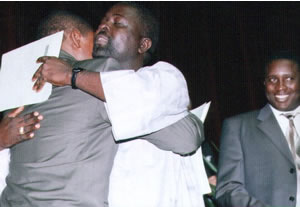
Working With LURD: Still a Dangerous Proposition
By Theodore T. Hodge
Thodge@theperspective.org
The Perspective
Atlanta, Georgia
September 17, 2003

Working With LURD: Still a Dangerous Proposition
By Theodore T. Hodge
Thodge@theperspective.org
The Perspective
Atlanta, Georgia
September 17, 2003
 |
| After signing the Peace Agreement, Taylor's Lewis Brown and MODEL's Thomas Nimely embrace while LURD's Damate Conneh looks on. |
On the other hand, there were those who thought that the premise of the agreement was flawed: "Share with the warring factions positions of power and we will have peace in the country." Be it as it may, the general and prevailing notion was, "Let's give peace a chance; it's time to move on."
Against this background, it was disheartening, if not shocking, to read a recent article titled, "LURD Threatens to Quit Government over Jobs Row." According to the article, LURD's Secretary General, Joe Gbala, speaking to IRIN was quoted saying: "There are attempts by some associates of incoming transitional leader Gyude Bryant to stop the warring parties from occupying certain slots given to us in the Accra agreement." Apparently, they still consider themselves ‘the warring parties'. But at war with whom?
Speaking further, the Secretary General added, "They want Bryant to appoint all assistant ministers, which is a violation of the agreement."
Was this the beginning of a serious conflict that could potentially damage the peace process or was this a minor political posturing among these various actors? This question, in my view, was answered the following day when LURD issued a press statement. The press statement, published by The Perspective, is full of colorful and undiplomatic language. It may even be considered threatening. The bottom line is this does not bode well for peace and the weary Liberian people.
At the risk of being seen as a partisan - which I'm not, because I belong to no political party, nor am I closely aligned with any of the major political stakeholders - I have to disagree with LURD's demand that Chairman Bryant should not be allowed to appoint all assistant ministers. Who Should?
The agreement (purposefully or inadvertently) leaves out the issue of the appointment of assistant ministers. I think we can reasonably assume that it must then automatically fall under the realm of the chairmanship. Assuming there is an implied supremacy clause to this contract; one must conclude that any matter not specifically covered by the contract must be left to the discretion of the chairman.
For the sake of fairness and balance, let us assume that LURD does have a legitimate concern. Let's assume that their charges against the Bryant transitional team deserve some merit. The question that comes to mind is: Is this the best way to handle such a sensitive issue? Whose interest is served by quitting the coalition? Why not go through the usual diplomatic channels to seek relief? Why not bring this matter to the attention of the international arbitrators who helped guide the peace process so patiently? Certainly their concerns are better served through diplomacy and legal channels instead of these irresponsible threats they've chosen to issue.
It is my gut feeling that the majority of Liberians will not care too much who appoints these assistant ministers. What we find quite bothersome and frustrating is the intent of these parties assumed to be serving our interests. Are they, really?
What these so-called warring parties (along with their civilian counterparts) should be concerned about is one relevant question. They should ask themselves: Are we doing this for Liberia? In other words, is it our intention to put the interests of the Liberian people first or are we trying to milk this golden opportunity for our personal aggrandizement?
These are trying times for the country and we are going to remember them for a long time to come. Many concerned Liberians wanted Mr. Taylor out. It must be remembered that the battle to dislodge Mr. Taylor was not fought on one front. It is a bit self-delusional for any one group to try to take the credit for our collective effort. (And LURD tried to do so in their recent press release).
At the height of the campaign to dislodge Mr. Taylor all of us, whether we used a pen, a microphone or a gun declared one intent: to liberate the Liberian people from the shackles of tyranny. We are almost there and we must not blow it over some petty personal desires.
The writer William Faulkner was awarded the Nobel Prize for Literature in December of 1950. To begin his acceptance speech, this is what he said: "I feel that this award was not made to me as a man, but to my life's work - a life's work in the agony and sweat of the human spirit, not for glory and least of all for profit, but to create out of the materials of the human spirit something which did not exist before. So this award is only mine in trust…"
An editorial comment accompanying this memorable speech reads: "Faulkner's famous address evokes the American credo of sacrifice, duty, compassion, and endurance in the face of the demeaning fear engendered by depression, war, and the atomic bomb. In reality his words were an affirmation of life against death, and Americans saw it not as a message directed only to writers and artists but as an appeal to all."
In that same spirit I ask LURD, MODEL, GOL, all the political parties and other stakeholders to work out any perceived discrepancies with the transitional team of Chairman Gyude Bryant. Let's put the flamboyant rhetoric aside and demonstrate ‘sacrifice, duty, compassion, and endurance in the face of the demeaning fear engendered by depression and war'.
Remember, Liberia is only yours in trust - for only two years. But your deeds and words during this short period will be recorded by historians and remembered by the present generation as well as generations yet unborn.